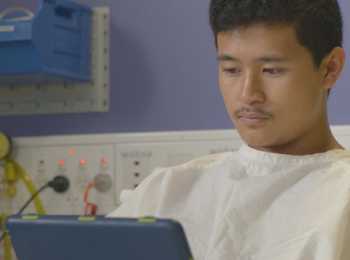Finding out
You may have found it hard to focus or concentrate since you found out your parent has cancer. This could be because you are having more thoughts or other things are on your plate that weren’t previously there as much. Here are a few things that might be helpful to know:
People do survive cancer
Some people will have medical treatment for their cancer and can get better relatively quickly. When we write about treatment, we mean things that you may have already heard about, like chemotherapy (“chemo”) or radiotherapy (“radiation”). Treatment can be very tough with the side-effects that people experience (low energy, possible hair loss).
There are other people with cancer who will need to have treatment for a longer time. Although the plan is for them to have longer treatment, there should still be periods where things feel more ok where the side effects may not be such a problem despite the treatment continuing.
Many factors will affect the outcome of your parent’s cancer (you may have heard the word“prognosis” being used to explain this) including the type or stage of cancer and whether the cancer has spread in their body (“metastasis”).
New and better ways of diagnosing and treating cancer are being discovered all the time. Iit may be reassuring to remind yourself when you’re feeling uncertain or afraid that people can get better and do survive cancer.
Shared experience with others
While no-one will feel the same way as you and each cancer experience is different, it could be helpful to know that around 21,000 young people find out their parent has cancer each year.
Knowing that other people share a similar experience can be powerful. Other young people who have been through a similar thing can also share their ideas about what helped them get through it.
Through Canteen, you can meet and connect with other young people who understand what dealing with a parent’s cancer is like. Canteen has an online community where you can chat with other young people who get what you’re going through. To join the Canteen Connect community, visit canteenconnect.org.
Canteen also offers events and overnight programs that you can join with other young people who have a similar experience. This can be an empowering and helpful experience.
You haven’t caused your parent’s cancer
Lots of things cause cancer, many of which doctors and researchers don’t yet fully understand. But we do know that your parent having cancer has nothing to do with anything you said, thought or did. You may wonder or feel that it is your fault; something as big as cancer can bring up lots of tricky thoughts or feelings for people. When these types of thoughts or feelings come it could be helpful to gently remind yourself that it is not scientifically possible that you caused your parent’s cancer.
Knowledge is power
Learning more about the type of cancer your parent has and its treatments from a trustworthy source can take some of the fear out of it and be a comfort.
If you’re wondering about anything at all, try asking your parent or other family member, it could also be that your parent’s medical team may be able to answer questions.
Trying to find knowledge and information from known or trusted sources is also important, your parent may have been given information that you are unaware of so it could be worth asking them.
Cancer Council has a lot of up-to-date information about cancer types and treatments - https://www.cancer.org.au/cancer-information
Knowing that your parent has cancer is one of the hardest things you’ll ever have to deal with. Every family member will react to the diagnosis in their own way. Your thoughts and feelings may be overwhelming, but we do know that both things do come and go for people like waves and the beach. Feelings and thoughts rarely stay the same for long periods.
It’s okay to feel what you are feeling. You may feel scared or sad. It can be that when feelings are hard to get out or it’s hard to find the words to explain how you’re feeling, that trying to speak to somebody who you think may help can be super important rather than keeping it all inside. This may be your parent or other family member; it could be a friend or other trusted person in your life.
You can get support
Health professionals like social workers or psychologists are trained to listen and can help by talking and linking you with support if this is needed. If your parent is in hospital or a medical team is coming to your home, most major hospitals and medical teams should have support people available to you, just ask whoever the family’s main contact person is for the treatment (often this is a nurse).
Canteen provides a free and confidential counselling service. You can also ask your family doctor/GP to recommend a counsellor or psychologist near you, there may also be low-cost youth specific counselling or support services in your area, these will come up on an online search.
A GP can write you something called a mental health treatment plan to see a counsellor or psychologist that can make sessions more affordable under Medicare. Speak to your GP or look at the Medicare website for further information.


















